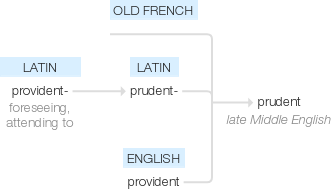Prudent
late Middle English: from Old French, or from Latin prudent-, contraction of provident- ‘foreseeing, attending to’ (see provident).
wiktionary
From Middle English prudent, from Old French prudent, from Latin prūdēns, contracted from prōvidēns(“foresight”) (English providence), the past participle of prōvideō(“I forsee”). Unrelated to prude. Doublet of provident.
etymonline
prudent (adj.)
late 14c., "wise, discerning, judicious," from Old French prudent "with knowledge, deliberate" (c. 1300) and directly from Latin prudentem (nominative prudens) "knowing, skilled, sagacious, circumspect;" rarely in literal sense "foreseeing;" contraction of providens, present participle of providere "look ahead, prepare, supply, act with foresight," from pro "ahead" (see pro-) + videre "to see" (from PIE root *weid- "to see").
The sense gradually grew to emphasize the notions of "discreet, circumspect; careful of self-interest." As a noun, "wise ones, skillful ones," late 14c. Related: Prudently.
